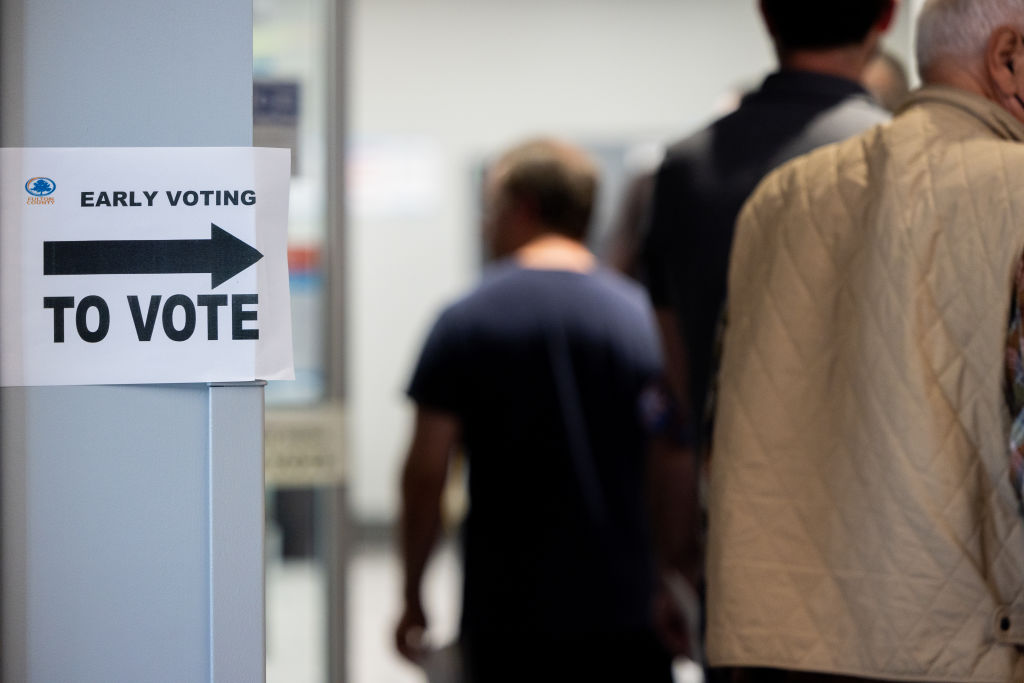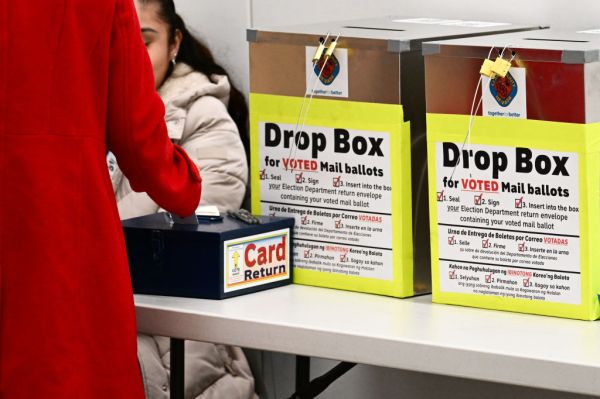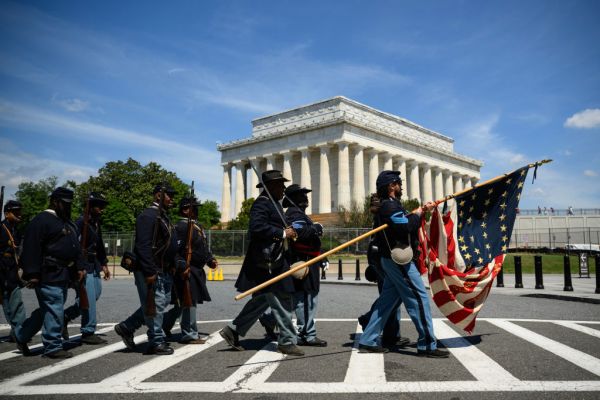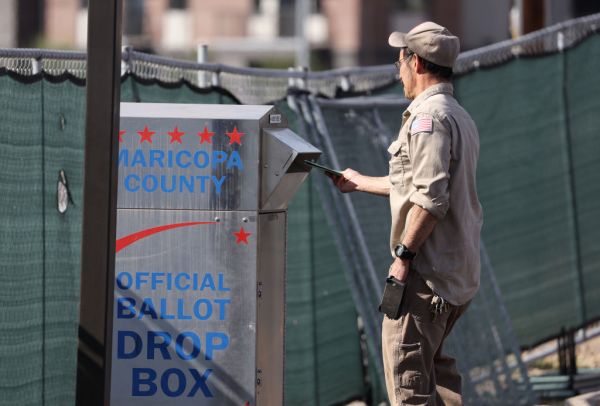Despite the 2020 election achieving the highest turnout in recent American history and being generally secure, only 47 percent of Americans say they have “a great deal” or “quite a bit” of confidence that the results of next week’s midterm elections will be counted accurately. Over the last two years, that sour outlook has bled into what usually is a banal political process: state legislatures making election law changes.
According to the National Conference of State Legislatures (NCSL), all 50 states introduced election-related legislation in 2021, with 292 laws enacted in 45 states. In 2022, there have been 277 laws enacted in 45 states.
Recent debates in state legislatures have centered around whether to return to some semblance of pre-COVID norms or make pandemic-related accommodations permanent, as Massachusetts has done with expanded vote-by-mail. But the most high-profile changes have taken place in larger or more competitive states such as Georgia, Florida, Texas, and Arizona.
What are those changes and how could they affect this year’s midterms?
Georgia’s SB 202—which, among other provisions, expanded early voting and demoted the secretary of state to a non-voting role on the State Election Board—received a lot of attention when it was being debated and passed last year, with President Joe Biden and prominent Democrats hyperbolically referring to the bill as “Jim Crow 2.0.”
But if the bill was intended to have a suppressive effect, it doesn’t seem to be working: Turnout in both this year’s primary and in early voting for the general this year have set records (though we’ll know a lot more after November 8).
“It’s kind of this mixed bag,” Collier Fernekes, a research analyst at the Bipartisan Policy Center, said of the Georgia bill.
Georgia was far from the only state to make significant changes. Arizona’s SB 1485 turned the state’s “permanent early voting list” into an “active early voting list.” Voters on the list receive early ballots for each election cycle—unless they go two consecutive election cycles without voting. In that case they will receive a notice asking them to confirm whether they want to remain on the list.
“That was a surprise for people” given Arizona’s history of successful vote-by-mail, Fernekes said.
Several states that had not previously codified rules around ballot drop boxes have now done so. One notable example is Florida, which rebranded drop boxes as “secure ballot intake stations” and required they be monitored by an employee. If a Florida voter were to return a ballot to an intake station while it is unmonitored, the election supervisor in question could face a $25,000 fine.
John Fortier, a senior fellow at the American Enterprise Institute, said some states approach drop boxes differently depending on whether they want to prioritize voting by mail. But he worries about the effects of election supervisors being held personally responsible for such stiff penalties. Uniformity in statewide policy may be a laudable goal—but “the idea of putting into that high monetary or criminal penalties is a terrible idea,” that could discourage people from becoming election officials, he said.
The same Florida law that renamed drop boxes, SB 524, banned ranked-choice voting in the state and created an “Office of Election Crimes and Security” within Florida’s Department of State, among other provisions. In August, the election crimes office charged 17 people for illegally casting ballots in 2020.
Florida is also one of 21 mostly conservative states that now “prohibit, limit or regulate the use” of private donations in election funding, according to NCSL. All of that legislation emerged after the 2020 election cycle, during which grants from the Center for Tech and Civic Life funded by Facebook founder Mark Zuckerberg and his wife, Priscilla Chan, became the subject of public scrutiny.
Fernekes thinks funding for elections should come from the government, not private sources. But philanthropic dollars became an issue in 2020 because election administrators felt squeezed financially—and in her view, that issue hasn’t been adequately addressed.
“It’s not preferable to have money that’s not public money in these projects,” she said. “But that means that we have to ask the question of what are we going to do from here on out to make sure that we have money to be able to actually conduct elections. … A lot of legislation that’s been passed since 2020 has really just opened up more lines of questioning.”
Fernekes described HR 1, national Democrats’ wish-list election reform bill, as “an unfunded mandate” that would have asked states and localities to expand access to the ballot without providing enough funding for implementation. HR 1 passed the House of Representatives in March of last year, but has not been brought forward for a vote in the Senate, where it lacks the 60 votes it would need to pass.
“If you’re telling a small office in Iowa that they’re required to send everyone in their town a ballot, but they don’t have any money to do that, and if they don’t follow through with that, are they going to get in trouble?” she asked.
Because states run their own elections, policy conversations often center on the question of how much leeway local officials should have in making decisions—and that’s been reflected in legislation the last two years.
Texas’ SB 1, for instance, put an end to the pandemic-era practice of drive-through voting in Harris County, where Houston is located.
Some red counties in Arizona and Nevada have used their leeway to try to count ballots by hand—a move that Fortier described as “overkill for worries about the technology side.” (The Arizona hand count effort got the go-ahead from the state’s attorney general provided the local Republican and Democratic parties can come up with volunteers, while the Nevada effort has been stopped by the state secretary of state.)
Because the Arizona hand count will happen alongside the machine count, election-watchers shouldn’t expect it to delay the results. But other states, including Pennsylvania and Wisconsin, still have laws on the books mandating that absentee ballots cannot be pre-processed until Election Day, and several states could be held up waiting for absentee ballots postmarked by Election Day to arrive.
Those absentee ballot policies could make the tabulation of the final results take longer in those states—but with so many variables, it’s hard to know ahead of time how any particular policy will affect an election. “While original versions can seem a lot more controversial and harmful,” Fernekes said, “what ends up actually passing and being signed by these states’ governors ends up being more nuanced.”









Please note that we at The Dispatch hold ourselves, our work, and our commenters to a higher standard than other places on the internet. We welcome comments that foster genuine debate or discussion—including comments critical of us or our work—but responses that include ad hominem attacks on fellow Dispatch members or are intended to stoke fear and anger may be moderated.